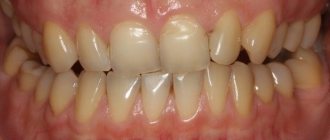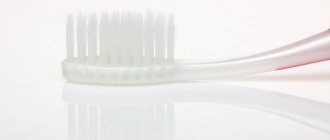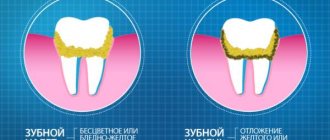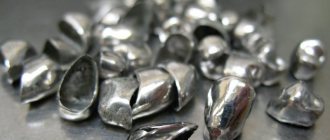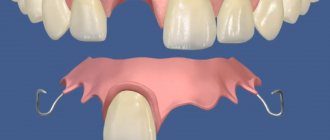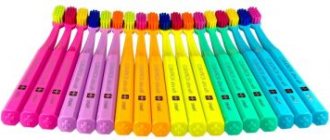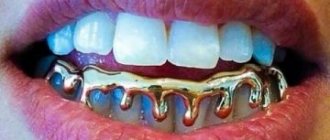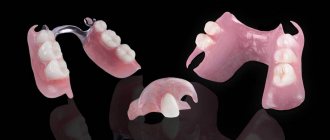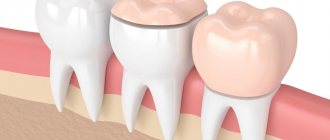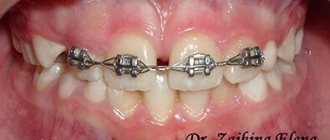Dental floss is an oral hygiene product that helps clean the interdental spaces. It is in these areas that the most plaque and food debris accumulate, which create a favorable environment for the development of caries. No brush can fit into these spaces, so flossing is not an alternative, but an important addition to your daily hygiene routine to keep your smile healthy and beautiful. To choose the one that's best for you, weigh the pros and cons of both types of waxed and unwaxed dental floss.
What is dental floss used for?
Floss easily copes with the difficult task of cleaning the interdental spaces. This hygiene product is especially recommended for people with crowded teeth and those undergoing treatment with braces. Timely removal of residues prevents the development of caries and gum disease. Many people believe that a toothpick is sufficient for this purpose. Dentists have a unanimous opinion on this matter: a toothpick, unlike floss, only harms the teeth.
Lanshina Natalya Viktorovna
hygienist at pediatric dentistry “Zubrenok”
The difference between dental floss and a toothpick is fundamental. Properly selected dental floss, when used correctly, removes plaque and food debris from the interdental spaces and does not injure the oral mucosa and the ligaments that hold the tooth in the bone. This is a means of dental care, prevention of caries and periodontal diseases. A toothpick is used to remove food stuck between teeth, in cavities, or under the gum. It injures the gums and ligaments of the tooth, leaving microbial plaque intact. People who use a toothpick have some kind of unresolved dental problem, a chronic disease in the oral cavity that requires emergency dental care
How often can it be used?
In principle, dental floss should be used as needed, but dentists advise flossing daily before bed, or at least 2-3 times a week.
It must be said that experts differ in their opinions about when to use floss - before or after brushing your teeth. Some believe that flossing after a toothbrush promotes better oral hygiene, while others believe that it should be used before a toothbrush, since after cleaning the interdental spaces, the toothbrush will clean the teeth better. In fact, this is not fundamentally important, the main thing is that dentists unanimously say that using dental floss is useful.
What dental floss is best to use?
The choice depends on the characteristics and condition of your teeth. First of all, we recommend deciding on the shape of the dental floss.
- Round floss is designed for normal and wide spaces between teeth.
- Tape floss is recommended for those who have gaps between teeth - trema and diastema.
- Flat floss is suitable for people with narrow interdental spaces.
The best dental floss is the one that is perfect for you. The health of your teeth and gums depends on the correctly chosen form. A small thread diameter will make cleaning ineffective, and a wide thread can injure the gums. If in doubt, consult your dentist about which dental floss is best for you.
Lanshina Natalya Viktorovna
hygienist at pediatric dentistry “Zubrenok”
The choice of dental floss should be individual. The hygienist or dentist knows all the nuances that need to be taken into account. Waxed and flat threads penetrate more easily into hard-to-reach places in the presence of orthopedic structures and crowded teeth. Unwaxed - better clean the contact surfaces of teeth from food debris and accumulation of bacteria. This type of floss is recommended for patients who regularly take care of their teeth, have a relatively healthy mouth, and do not have many fillings or crowded teeth. Threads that swell under the influence of saliva, as well as round cross-section, are characterized by increased atraumaticity. They clean wide interdental spaces well. Flosses are impregnated with deodorizing components and medicinal additives to fight bacteria and inflammation.
Dental floss can be made from natural material - silk (it is not very durable and is quite rare) and from artificial material, such as nylon or nylon.
Important Application Tips
So that you can successfully master this device and get the most out of it, follow these recommendations:
- don’t skimp, you’ll need a fairly long piece for comfortable grip;
- The cleaning procedure must be regular - repeat it daily before bed;
- During the cleaning process, try not to put too much pressure on your gums, so as not to damage them and cause bleeding;
- do not pull the floss under any circumstances, all your movements should be slow and careful;
- if you have quite significant gaps between your teeth, use round floss;
- if the teeth are pressed tightly, choose flat;
- children can use floss, but from the age of 8-10, when they are already able to use it adequately and safely, until this age it is important for them to learn how to brush their teeth correctly;
- If the thread breaks or flakes heavily during the process, this may be a sign of problems in the contact areas of your teeth (such as overhanging fillings or contact caries).
And most importantly, remember: dental floss is not an adequate replacement for toothpaste and brushes. But it is only their important and significant addition!
And if you apply all this together correctly, your teeth and gums will definitely thank you.
Waxed dental floss
Waxed dental floss has a smooth surface, making it easy to glide between teeth. We recommend it for those who are just starting to use dental floss: the risk of gum injury is significantly reduced. Waxed dental floss is durable, does not tear, and has a long shelf life - from 5 years. The only drawback: impregnated floss does not remove plaque very well - it is smooth and quickly slips in the interdental spaces.
What types of impregnations are there?
- Chlorhexidine - antibacterial, disinfecting effect of Curaprox DF 820.
- Herbal extracts help gums stay healthy.
- Potassium nitrate - caries prevention PresiDENT Sensitive.
- Menthol, mint - fresh breath Donfeel UF-623.
The impregnated mini-floss is convenient to carry with you - even in a handbag it does not take up much space (Donfeel Dental Floss mini-floss). The price of this thread is lower, since it is not very long.
The benefits and harms of using hygiene products
Floss as a hygiene product has a lot of advantages: it is good as a tool for cleaning teeth in hard-to-reach places where a toothbrush cannot penetrate, it protects the oral cavity from harmful bacteria, it is affordable and suitable for children and adults. It is impossible not to mention the disadvantages:
- if used insufficiently carefully, you can injure tender gums, which will result in an inflammatory process, which, in the absence of qualified medical care, can result in tooth loss;
- due to frequent and too vigorous brushing, gums may begin to bleed;
- Dentists consider periodontitis a contraindication for flossing, so if you notice blood, flossing should be stopped;
- floss is not an independent hygiene product; it should be used in combination with a toothbrush, toothpaste and mouth rinse - this is the only way to maintain a snow-white smile;
- experts note that in their practice there are cases of partial or complete destruction of diseased teeth due to the use of floss, so before you buy floss in a store, check with your dentist about the advisability of its use.
Sources:
- https://www.zdoroviemed.ru/stati/kak-pravilno-polzovatsya-zubnoj-nityu-poshagovaya-instrukcziya/
- https://24stoma.ru/zubnaya-nit.html
- https://dr-zubov.ru/krasota-i-uxod/sredstva/zubnye-niti/kak-pravilno-i-bezopasno-polzovatsya.html
- https://dentamed.club/gigiena/profilaktika/kak-polzovatsya-zubnoy-nityu.html
- https://MikDent.ru/estetika/uhod/kak-polzovatsya-zubnoj-nityu.html
- https://familystr.com/eto-interesno/poleznie-soveti/kak-polzovatsya-zubnoj-nitju/
How to choose the right floss
First of all, pay attention to the quality of the product. If a certified product is important to you, then purchase floss in pharmacies. High-quality products are distinguished by natural materials and are made on a silk base (waxed or unwaxed). They do not get stuck between the teeth and do not tear prematurely.
If this is a fake, then there can be no talk of any silk threads. The floss material is nylon or nylon. The main difference between the best quality brand and a fake is the price and place of sale. Low-quality floss can be sold anywhere except pharmacies.
General advantages and disadvantages
Don't be fooled by flossing: they also have disadvantages. But most often problems occur due to improper use. It is worth considering both the pros and cons:
Pros:
- Cleans the interdental space that is inaccessible to a regular brush.
- Floss is easy to use; you don’t need any special skills to use it.
- Available to everyone, you can purchase it in almost any store.
- You can use it from anywhere. You don't need paste or water.
Minuses:
- An incorrect movement can damage the gums and create a risk of infection.
- Frequent use threatens damage to tooth enamel. This, in turn, can lead to various consequences, including caries.
Anna LosyakovaDentist-orthodontist
The floss itself is not dangerous, but its improper use can harm your teeth. In all other cases, flosses bring only benefits. And one more thing: make sure that you are not allergic to the material from which the waxed dental floss is made.
Improper use of thread can cause bleeding
In the video, the doctor talks about the benefits and disadvantages of dental floss:
Contraindications to the use of threads
Dentists prohibit the use of floss during inflammatory processes on the oral mucosa. Active periodontal disease, gingivitis and stomatitis require preliminary therapy. Only after healing can the doctor allow flossing.
The main damage is caused by incorrect application technique. Aggressive movements can injure the gums, cheeks, and tongue. An infection can get into the wounds, causing inflammation and bleeding. Permanent injury can lead to tooth loss. Therefore, if in doubt or after unsuccessful attempts to use floss, you should contact your dentist for help.
The most common brands
Currently, many threads are produced from well-known brands. The most popular of them are flosses from the famous Oral b brand, such as Satin Floss, Super Floss, Essential Floss, Pro Expert, etc. Most often you can only hear positive reviews about them.
Oral-b Satin Floss
Oral-b Super Floss
Oral-b Pro Expert
Oral-b Essential Floss
But there are other models that are not intended for everyone, since there are certain criteria for their use depending on the individual characteristics of the person:
- Floss from the Dental Floss series from the manufacturer Splat is best used by people whose teeth are located at a distance from each other. But the Essential Floss model is suitable for those who have a dense row of teeth.
- There are models for those who have periodontal problems. These are flosses called Sensodyne. They have the property of swelling during the treatment procedure, which will allow for better cleaning of the spaces between the teeth. Threads from the manufacturers Colgate, Rocs, Dentorol, Jordan have proven themselves well.
SPLAT Dental Floss
Sensodyne
Colgate
Rocs
Dentorol
Jordan
The cost of such products varies between 150–450 rubles. The price will depend on the manufacturer, the quality of the product, the length of the thread and its purpose.
For example, Colgate Optic White thread is not too expensive, but its quality is in no way inferior to more expensive brands. The length is also not small - it is 25 meters, which allows you not to think about a new purchase for a long time.
Anna LosyakovaDentist-orthodontist
The thinner the floss, the faster it penetrates into the space between the teeth, cleaning them and giving fresh breath (here, unwaxed dental floss wins over its competitor).
What are their differences?
When shopping for floss, you need to know that they are not all created equal. To achieve the best results, before purchasing them, you should decide on the type, focusing on the shape of your teeth.
There are waxed and unwaxed threads. Their difference is as follows:
- Waxed - due to their good smoothness, they can penetrate between the teeth, even if they are tightly connected to each other. The floss structure is dense. It is recommended to use waxed floss for people with dense teeth and those who have many fillings.
- Unwaxed ones clean the interdental space better. They penetrate deeper and eliminate almost all food residues. Unwaxed floss can clean most of the dental spaces without wasting a lot of material. This is achieved by peeling the thread into several thin fibers.
The thread itself has the following characteristics:
- round - designed for wide interdental openings;
- flat - necessary for people with dense teeth, that is, when there is practically no space between the teeth.
If you are faced with a choice - waxed or unwaxed thread, then remember that the second does not contain wax. The waxed one is treated with it, thanks to which it glides better and penetrates even the densest dental spaces.
The thread can be impregnated or unimpregnated. Impregnated floss is treated with special substances that, in addition to cleaning, perform other additional functions, for example, giving the mouth a fresh smell, strengthening the enamel, etc.
